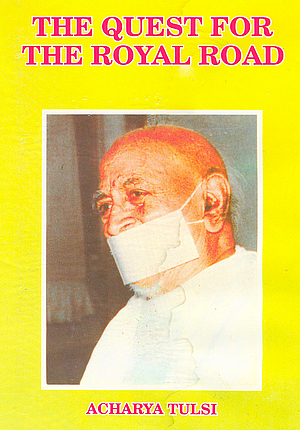In this, the land of India, where the sandals of Rama remained installed for 14 years as a symbol of an understanding between Rama and Bharat, where Mahavira and Buddha, after abdicating their Self-rose to the height of greatness, where Krishna preached the Gita on the battlefield of Kurukshetra and where Gandhiji, symbolising our culture, left behind a lusture in the world. How does one feel when in that same land, there is scramble for ostentatious lifestyle, and the unveiling of the status of national figures by lustful hands? Purposeless politics, growing non-violence and character-assassination at every level, have fragmented the whole national pattern as it were. Looking at the turn the situations are taking place, we cannot be sure if democracy itself becomes for us a question to ponder over.
On the occasion of the 28th annual convention of the anuvrat campaign, I am presenting my ideas particularly before the people, especially those who are in a position to lead. -
It is my belief that morality and ideals come to the individual from within. Nevertheless, we cannot ignore the fact that the perversion of the administrative system lead to the perversion of ideas. Ideas infringe on the system. That makes the full circle and the situation, instead of getting resolved, continues to become more complex. As a result, without political stability and clean atmosphere, the country faces moral and cultural degeneration. It has been correctly said that political authority in the country is the cause of morality or immorality prevailing in the country. The popular adage "as the ruler, so the ruled" does not seem to be unjustified in a larger sense.
Today, when Parliament alone is the highest institution of power, it is the responsibility of every Member of Parliament that they must look at themselves.[1] The dignity of Parliament is the dignity of the country. If the Members of Parliament sell themselves for money or position in response to signal from outside, the fact of national independence even after 32 years would have to be called only self-deception.
From this point of view, the first thing to ponder over is that the politics of the country should be clean and stable. Some of the points regarding clean and healthy atmosphere are:
- The democratic and secular form of our government should remain intact. If distinctions are made in administration from the Hindu, Muslim, Akali or Tamil point of view, India would not survive as one country.
- Let truth and non-violence be the basis of politics (violence and double standards would ultimately be detrimental to democracy).
- Reinstating the sanctity of individual life and principled politics.
- Changing the administrative system too in view of the electoral system and the results.
- Abandoning the ruinous path of character assassination.
- Forming the code of conduct for the legislators.
- Imparting moral education and establishing communal harmony.
These are some basic tenets which need to be considered to-day by everyone who upholds the principle of democracy. Security is the primary demand of every citizen. Without fulfilling this demand, there is little chance that the nation would be prosperous and happy. The nation which protects itself with the armour of good character cannot be insecure in any situation. National character and -'emocracy are mutually dependent.
In conclusion, at this critical moment, I would like to call upon the builder of the nation and tell them that our ancestors have handed over the sacred heritage of culture and freedom and it is our duty to make it most sacred and dedicate it to our coming generations. May it all be good and beneficial for all.
Restraint, verily, is life.
 Acharya Tulsi
Acharya Tulsi
